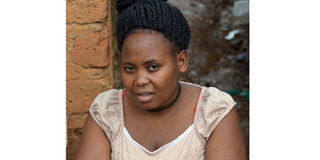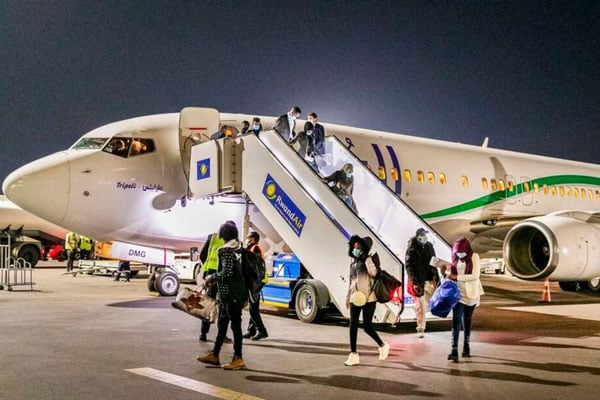Sentenced to life indoors: Story of struggle with Lymphedema

Jessica Babirye. What started as a boil has sentenced her to life indoors.
What you need to know:
- In 2013 when Jessica Babirye noticed a small swelling on her upper left thigh as she prepared for work, she did not think much of it. She says she just ignored it thinking it would disappear on its own.
- However, a few days later, Babirye got concerned after noticing that the boil had instead increased in size, this time to the size of a small passion fruit. She adds that it was now very painful and itchy.
- While at home, Babirye’s leg continued swelling and by now the pain was unbearable. In desperation, she decided to seek the help of a traditional healer who, she says, claimed to cure all diseases.
- Dr Joseph Mayambala, a general physician at Ntebetebe Community Clinic, where Babirye currently goes for treatment, says some of the tests carried out confirm that she has lymphedema, an abnormal swelling that occurs either in the arms or legs.
In 2013 when Jessica Babirye noticed a small swelling on her upper left thigh as she prepared for work, she did not think much of it. She says she just ignored it thinking it would disappear on its own.
However, a few days later, Babirye got concerned after noticing that the boil had instead increased in size, this time to the size of a small passion fruit. She adds that it was now very painful and itchy.
At the time, Babirye resided in Ntwetwe Sub-county, Kyankwanzi District, where she worked as a farmer after dropping out of school in Primary Six due to lack of tuition. She stayed with her mother (who later passed away in 2014). Babirye’s father had died when she was still young.
Hospital visit
“My mother took me to several health facilities around the neighbourhood to get medical attention. However, none of the treatments I was given worked and instead of getting better, my leg continued swelling,” she says. By 2015, the whole of her left leg was now abnormally swollen making it difficult to move on her own.
This forced Babirye to seek medical intervention at Kiboga Hospital where she was immediately referred to Mulago Hospital.
“A doctor at Mulago Hospital said I needed to undergo a number of tests first to ascertain what was wrong with my leg. They asked my family to pay about Shs250,000 but since we could not afford to pay the money, we returned home,” she says.
Traditional healers
While at home, Babirye’s leg continued swelling and by now the pain was unbearable. In desperation, she decided to seek the help of a traditional healer who, she says, claimed to cure all diseases.
“My mother and I first visited one around the neighbourhood who gave me some concoction to take daily. Although I followed his instructions, the medicine did not work,” she says.
Babirye decided to seek help from another traditional healer. “It was the same story. I was given a mixture of medicines to take but they too, did not work,” she says, adding that she decided to give up on this avenue when concoctions from a third traditional healer also failed to bring any relief.
Spiritual intervention
When the intervention of traditional healers failed to yield fruit, Babirye sought help from several churches. “At the respective churches, the clergy prayed and assured me that I will get well. Unfortunately, my condition just worsened,” she says.
Some pastors even visited Babirye at home to conduct special prayers but unfortunately, her condition has remained the same.
Since she could no longer take care of herself, in January, Babirye relocated to Ntebetebe Zone in Bweyogerere, Wakiso District, to live with her sister Rebecca Nakaweesi and husband, Moses Nsubuga. Babirye also believes that staying in Kampala gives her a chance to get better medical assistance from the various medical facilities available.
At the time Babirye moved in with the family, Nsubuga says she had an open wound, right below the knee, which also oozed pus. “We took her to Kiruddu General Referral Hospital located on Buziga Hill, Makindye Division where she underwent surgery to remove part of the infected wound. However, the hospital did not operate on the rest of the leg as a number of tests were still being carried out,” Nsubuga says.
Challenges
“I can hardly walk. If I need to go somewhere, for instance the bathroom or toilet, Moses and Jessica have to offer assistance. I have to lean on them in order to move from one place to another,” she says.
Babirye says a typical day for her involves waking up, taking a shower and sitting in one place indoors where she stays watching TV. Sometimes, she asks her sister or brother-in-law to take her outside to get some fresh air.
“The only problem with this is that some people stare and this makes me uncomfortable,” she says, adding, “There are some disturbing rumours that I was be-witched and when I hear all this, I prefer to remain indoors and hide.”
The diagnosis confirmed
Dr Joseph Mayambala, a general physician at Ntebetebe Community Clinic, where Babirye currently goes for treatment, says some of the tests carried out confirm that she has lymphedema, an abnormal swelling that occurs either in the arms or legs.
According to medicinenet.com, an online portal, lymphedema is swelling in one or more extremities that results from impaired flow of the lymphatic system. The lymphatic system is a network of specialised vessels (lymph vessels) throughout the body whose purpose is to collect excess lymph fluid with proteins, lipids, and waste products from the tissues.

In order to move, Jessica Babirye has to be assisted. PHOTOS BY ESTHER OLUKA
This fluid is then carried to the lymph nodes, which filter waste products and contain infection-fighting cells called lymphocytes. The excess fluid in the lymph vessels is eventually returned to the bloodstream. When the lymph vessels are blocked or unable to carry lymph fluid away from the tissues, localised swelling (lymphedema) is the result. Lymphedema most often affects a single arm or leg, but in uncommon situations both limbs are affected.
Dr Mayambala says common symptoms of lymphedema include swelling of either the arm of leg, heaviness, hardening of the affected part as well as pain. Treatment includes surgery involving removal of excess skin and underlying tissue, skin care in order to reduce infections as well as use of compressive garments such as stockings to press out the lymph fluid out of the affected limb.
“For Babirye’s case, I highly suspect it was an infection that was left untreated resulting in lymphedema,” Dr Mayambala says, adding that this will, however, be confirmed after extensive tests have been carried out.
Dr Mayambala adds that although amputation is often considered for such patients, unfortunately in Babirye’s case this is impossible. “This patient is anaemic, meaning that she has a low red blood cell count. Cutting off the leg may be risky as she may loose a lot of blood during the surgery leading to many complications including death,” Dr Mayambala says.
As much as Dr Mayambala tends to Babirye, he thinks that her condition can best be managed at a bigger health facility either within the country or abroad. “The concerned family continuously tell me they hardly have any money for her treatment. But as a doctor I keep advising them to look for it since the swelling continues to grow.”
Because of her condition, Babirye cannot work. Nakaweesi is a housewife while Nsubuga owns a small grocery stall. “I do not earn much from the business and the little I get has to be stretched to look after the family and also cater for Babirye’s medical bills,” Nsubuga says.
Who is at risk?
• Lymphedema most commonly occurs after surgery to remove lymph nodes in the armpit in breast cancer patients or lymph nodes in the groin to treat other types of cancer.
• Radiation therapy to treat breast and other cancers also sometimes damages the lymphatic system and limits normal fluid drainage.
• Patients who have damaged or missing lymph nodes and who are overweight also are more at risk for the condition.
• An infectious parasite can cause the condition in people living in certain areas of the world. This is very rare in developed countries, however.




